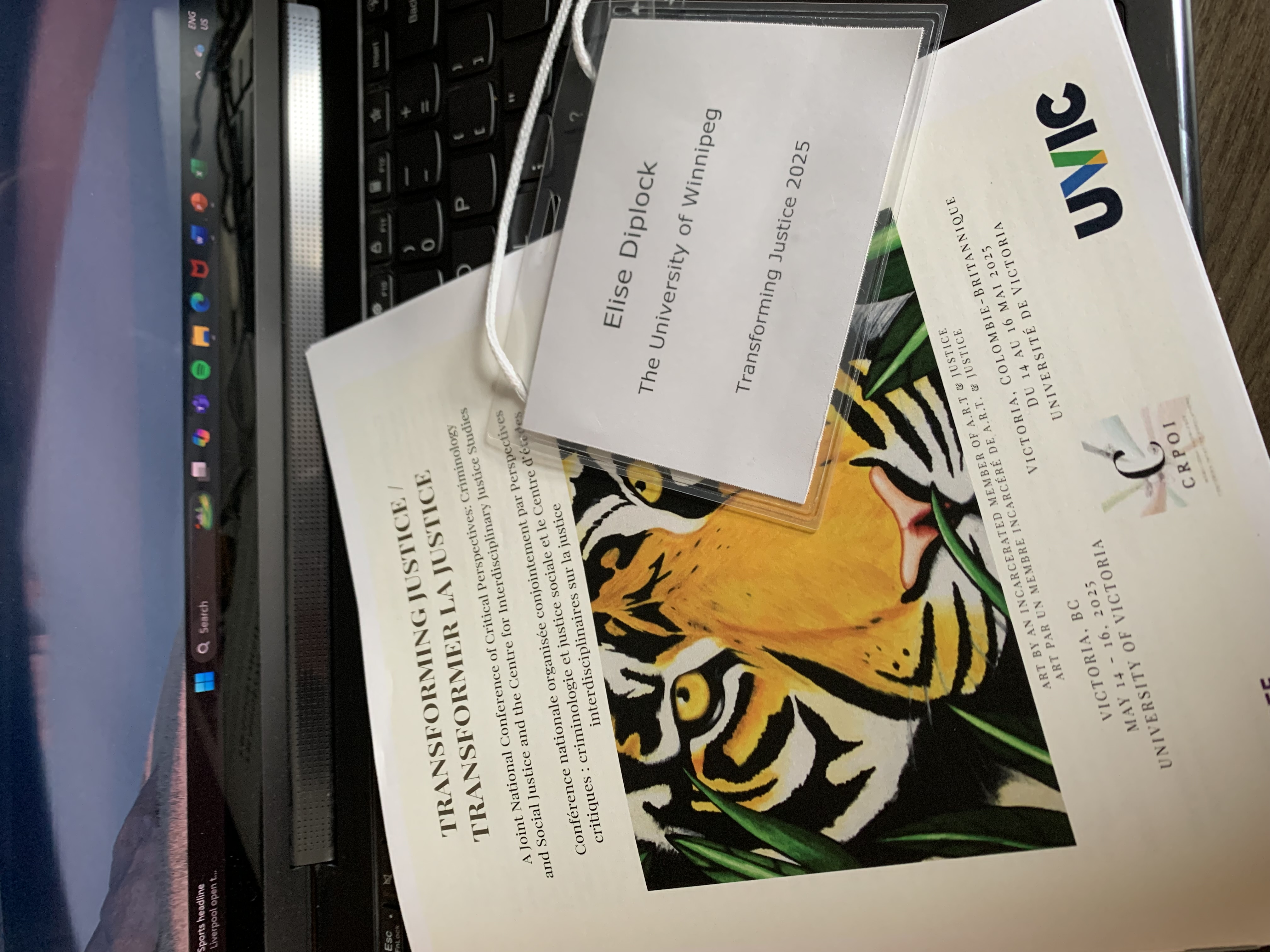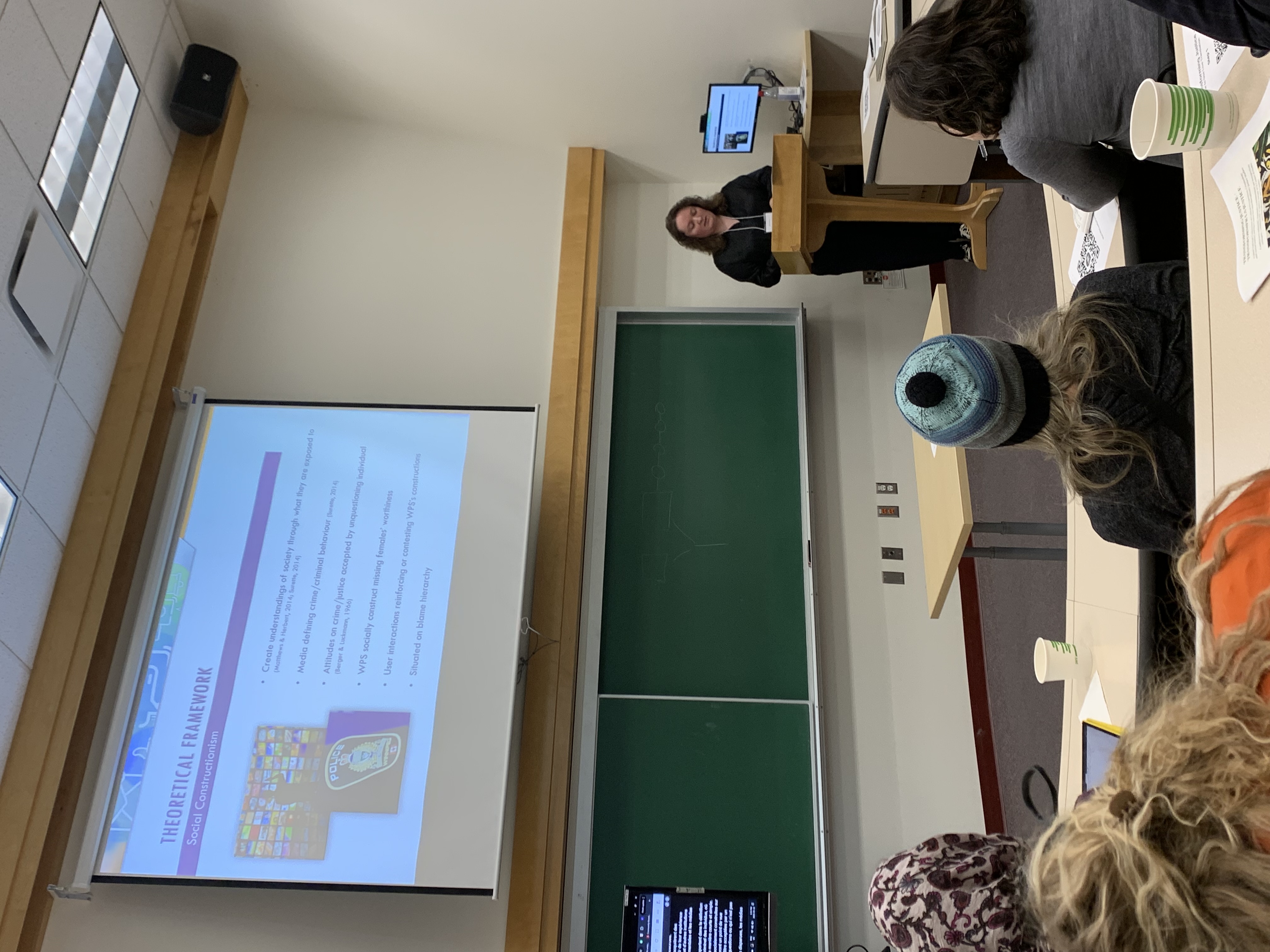Elise Diplock (Criminal Justice) Presents at Transforming Justice
Fri. Jun. 27, 2025
Elise Diplock, a student in the Master of Arts in Criminal Justice program, recently returned from Victoria, BC where she gave a talk at Transforming Justice: A Joint National Conference of Critical Perspectives: Criminology and Social Justice and the Centre for Interdisciplinary Justice Studies.
We checked in with Elise upon her return to learn more about her research and conference experience.
 First off, can you tell us a bit about yourself, your program, and your research?
First off, can you tell us a bit about yourself, your program, and your research?
My name is Elise Diplock, and I am a Master of Arts student in the Department of Criminal Justice. I was also an undergraduate student at the University of Winnipeg and graduated with my Bachelor of Arts (Honours) degree in Criminal Justice.
The Department of Criminal Justice’s Master of Arts program provides training opportunities for graduate students in research methods, criminological theory, and research related to the cultural, social, and governmental responses to crime and justice. However, my graduate research draws on qualitative and visual techniques of analysis of the photographs Winnipeg Police Service (WPS) shares of missing White and Indigenous women and girls on social media. By drawing on these analysis techniques, I was able to uncover how WPS socially constructs the social problem of missing women and girls in Winnipeg, and how the public reinforces WPS’s construction in ways that frame females along a hierarchy of blame.
Congratulations on being selected to participate in Transforming Justice! Can you tell us about what your role was and what made you decide to apply?
I was selected by the conference committee to present my graduate research at the Transforming Justice: A Joint National Conference of Critical Perspectives: Criminology and Social Justice and the Centre for Interdisciplinary Justice Studies which was hosted at the University of Victoria. This conference is the largest gathering of criminologists and interdisciplinary justice researchers in Canada.
I had first heard of this conference from my thesis supervisors, Dr. Sarah Heath and Dr. Steven Kohm. Both of my supervisors encouraged me to submit a proposal and present the findings of my research, as they believe in a mentorship where student researchers should learn by participating in a number of scholarly activities. My supervisors also believed that I would receive valuable constructive feedback from researchers during my presentation.
What were some of the connections between your research and other events at the conference? Did you have a chance to connect with or socialize with researchers from other institutions?
The theme for this year’s conference was ‘transforming justice.’ This conference theme offered a venue for researchers to discuss transforming concepts of justice and how justice is upheld and undermined in Canada’s criminal justice system. The conference provided an opportunity for researchers to discuss how justice can be transformed, for example, for individuals working in policing and/or the people involved with police. As my presentation highlighted policy implications for WPS regarding how they socially construct missing women and girls on social media, my research highlighted the conference theme that justice can be transformed, specifically regarding transforming policing practices in Winnipeg. Throughout the conference, I was also able to socialize with university academics, community researchers, and other graduate students who were conducting research on how justice could be transformed in law, politics, policing, courts, corrections, and community organizations.
 What was the highlight of the conference for you and what are you going to take away from your experience there?
What was the highlight of the conference for you and what are you going to take away from your experience there?
I really enjoyed that I was able to attend several conference sessions in research areas of criminal justice which I am interested in. I also attended conference panels where I listened to individuals with lived experiences of criminalization and those who are fighting for justice for their loved ones. The powerful messages in these sessions were a highlight for me as their stories further indicated that a transformation of justice in a number of criminal justice areas is needed.
Based on your experience, do you have any advice for students about to attend their first conference?
When my proposal was accepted to be presented at the conference, I was excited, but also a bit nervous about presenting my research. However, at the conference, my research presentation was well received, and I heard positive feedback and insightful questions from the audience. Based on my experience, my advice for students about to attend their first conference would be to have confidence going into your presentation. By preparing your presentation well in advance, rehearsing your points, and creating effective slides, your presentation will go smoothly and be well received by other researchers.
